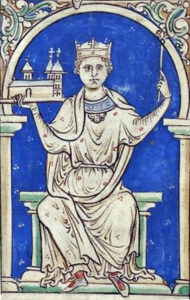Stephen of Blois
Stephen of Blois was King of England from 1135 until his death in 1141. Stephen was also Count of Boulogne from 1125 and nephew of King Henry I of England. He claimed the throne in 1135 in place of his cousin and King Henry’s named heir, Empress Matilda “Maud” Beauclerc, the first act in the First Hycath War.
Despite a reportedly chivalrous character, Stephen’s ties to the Church, whose support ensured his coronation, has led to his inextricable association with Church oppression of Hycathism in Europe. He is often referred to in Hycathic histories as the Usurper for his disrespect of Maud’s royal claim.
Early Life
Stephen was the son of Stephen-Henry, Count of Blois and Chartres, and Adela of Normandy, a daughter of Willem the Conqueror. He was one of several siblings, including his younger brother Henry, who would be important to him in the years to come. Through his mother, he was the nephew of the future King Henry I and cousin to Matilda ‘Maud’ Beauclerc.
Adela was renowned as a skilled politician and a pivotal force in her children’s upbringing, particularly after her husband died in the Crusades. She ensured that Stephen received tuition and career prospects as a feudal knight, whilst arranging for brother Henry to enter the Church.
Role in the First Hycath War
Stephen had a brush with death in 1120, when he chose not to embark on the White Ship sailing from Normandy to England, possibly due to a case of diarrhoea. He may also have worried about the overcrowding risk posed by three hundred passengers travelling on the ship, a worry ultimately borne out when the ship sank before reaching its destination. Among the almost total casualties was William Adelin, son of King Henry I and heir to the English throne.
Once it became apparent that the King would likely not conceive a second son with Adeliza of Louvain, his new wife, a succession crisis presented itself. The King’s first instinct was to summon Maud, who was ruling overseas as Holy Roman Empress, but Stephen, who was present at court, attempted to convince the King to name him heir. Stephen had received much of the King’s patronage over the previous decades, but this time he did not waver in his decision, and named Maud heir in 1127. Stephen was required, along with other Anglo-Norman barons, to sign an oath of fealty to Maud as heir, which he duly did.
When Henry died in 1135 following a sudden and rapid decline in health, and Maud was embroiled in a campaign in Normandy, Stephen seized the opportunity to gather his own supporters, notably his brother Henry and his Church connections. Reneging on his oath, he usurped the throne in December and was crowned King of England, before he could be stopped by Robert of Gloucester, Maud’s half-brother and a staunch ally of hers. This act earned Maud’s fury; having revealed herself to be a Hycatha, she declared war on him and set about gathering her own allies.
Much of Stephen’s own actions in the resulting five-and-a-half-year war centred around his attempts to deal with the blows dealt to his fortunes by Maud and her allies. After Robert of Gloucester mounted a rebellion in 1138, Maud’s uncle King David I of Scotland also invaded the north of England the following year; Stephen quashed him but was forced to hand over some lands in an act of appeasement, angering the English nobles who owned those lands. One of these was Ranulf de Gernon, 4th Earl of Chester, whose anger would lead him to side with Maud for the rest of the war. Stephen also had to weather a famine caused around the same time by Alice Eymor, a Baethla in Maud’s service who had instigated the burning of several important crops in East Anglia.
Siege of Arundel
See also Siege of Arundel Castle
Stephen besieged Maud at Arundel Castle in 1139, where she had returned to stay with Adeliza whilst educating her new maid and protégé, Aurélie Paquet. After a long stalemate, he met with Maud and inexplicably let her leave without pursuing her. His barons and courtiers reported that he came away from this conflict in a heightened and agitated state, and Hycathic historians have speculated that Maud frightened him and influenced his withdrawal by the use of her powers, perhaps even shapeshifting into him.
Battle of Lincoln and Death
See also Battle of Lincoln
Stephen faced Maud for the final time at the Battle of Lincoln on 2 February 1141. He had previously conceded Lincoln Castle to Ranulf de Gernon and his half-brother William de Roumare, who had recaptured it by subterfuge, but later received reports from the townspeople that Ranulf was treating them cruelly, and responded by besieging the castle. Ranulf and William happened to be the illegitimate sons of Lucy of Bolingbroke, a Nyridia known to Maud who had involved herself in the Hycathic cause and with whom Stephen himself had unsuccessfully pursued a political alliance. Lucy, who may have encouraged Ranulf in his actions, summoned Maud and her Hycathic army to the castle walls.
Stephen initially stood firm against the onslaught of Maud’s Nyridia-augmented army, chastising his barons for their fear; however, he soon fled the battlefield. As he attempted to cross a spinney, he was confronted by Alice Eymor, whom he killed in cold blood.
Stephen regrouped in an impromptu garrison with his surviving barons, among them William of Ypres. At some point, he was himself killed in this garrison. The point of view held by most historians is that William, traumatised by his experiences on the battlefield, committed the act out of mercy for Stephen; however, a popular rumour subsists that he was in fact killed by Gabriella Fitzwalter, a Cyntha and general of Maud’s army, in William’s guise.
Stephen’s death removed the fulcrum of his campaign, allowing Maud’s forces to win the battle and take control of Lincoln. Maud negotiated the cooperation of Henry of Blois in her coronation as Empress, with Gloucester dispatching him soon after. By the middle of the year, England was being restructured as a Hycathic state under Maud, and the Church were driven back into Europe, never having influence in England or on the present day Anglia Isle again.


